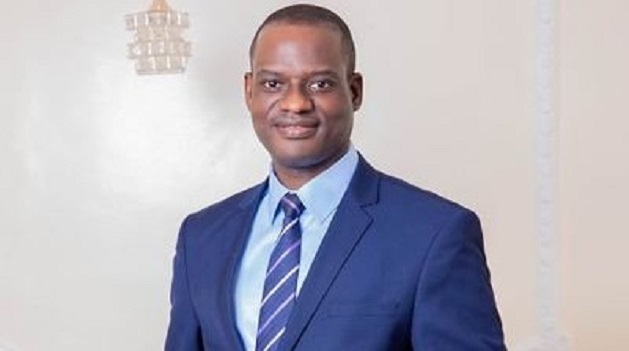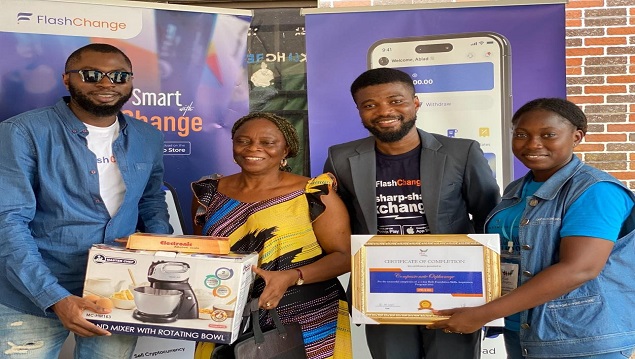General News
USPF hands over Emerging Tech Centre to Ogun State Institute of Technology

The Universal Service Provision Fund (USPF) of the Nigerian Communications Commission (NCC) has handed over a new Information and Communication Technology (ICT) project to Ogun State Institute of Technology (OGITECH), Igbesa, Ogun State.

The project named: Emerging Technologies Centre (ETC), sited on the Institute’s campus, is aimed at enhancing learning experience of students while providing a platform for digital innovation, research, and development (R&D) for the overall economic growth of Nigeria.
The highlight of the inauguration and handover ceremony on Thursday was the signing of a landmark Memorandum of Understanding (MoU) aimed at ensuring effective utilisation and sustainability of the ICT project in the Institute.
The ETC is one of the access projects of the USPF and a significant milestone towards the government’s policy direction to bridge digital divide and promote digital inclusion across Nigeria.
The Centre is equipped with 100 desktop computers, emerging technology applications, bandwidth, and connectivity tools, to provide students and faculty members with access to cutting-edge technology and resources.
Speaking at the official handover ceremony, the USPF Secretary, Yomi Arowosafe, said the Centre represents more than just bricks and mortar. According to him, it embodies a vision, a commitment, and an investment in the future of Ogun State, and by extension, the future of our nation, Nigeria.
“Under the strategic direction of the Hon Minister of the Federal Ministry of Communications, Innovation and Digital Economy, Dr. Bosun Tijani and strategic focus of the Executive Vice Chairman of the NCC, Dr. Aminu Maida, the USPF is vested with the mandate of providing ICT access to the unserved and underserved communities across the country,” he said.
Through strategic implementation, Arowosafe said the USPF has implemented various access and connectivity projects across the six geo-political zones of Nigeria, which has continued positively impact ICT utilisation and deepen connectivity across the country.
“With a student population of 9,300, OGITECH is one of the leading institutions of technology in Nigeria, and we are proud to partner with them to bring this project to fruition.
“The ETC will not only enhance the learning experience of students but also provide a platform for innovation, research, and development.
“We expect this project to have a significant impact on the institution and the wider community. It will provide opportunities for students to develop skills in emerging technologies such as artificial intelligence, data analytics, and cybersecurity.
“It will also enable faculty members to integrate technology into their teaching and research and to collaborate with other institutions and industry partners,” he said.
The USPF Secretary also stated that the ETC will serve as a hub for innovation and entrepreneurship, providing a platform for start-ups and small businesses to incubate and grow.
“We believe that this project will contribute to the growth and development of the Nigerian economy, and we are proud to be a part of it and we look forward to seeing the impact of this project on the institution and the wider community,” he said.
Arowosafe stated that the MoU signing has been designed as part of sustainability strategy for future projects of USPF, where the beneficiary organisations, group and communities can take ownership of such project and be committed to taking necessary initiatives to ensure it continually serves them without being abandoned after handover by the USPF.
In his remarks during the handover ceremony, the Rector of OGITECH, Dr. Abiodun Oluseye, applauded the NCC and the USPF team for siting the project in the Institute, promising that the project will be put into effective utilisation to benefit not only the Institute abut its entire community.
He also expressed commitment towards ensuring the sustainability of the project, as has been articulated in the joint MoU between the OGITECH and the USPF.
“We will ensure the sustainability of the project and work towards putting it into effective use for the benefits of the entire community,” he said.
The USPF was established by the Federal Government of Nigeria to facilitate the achievement of national policy goals for universal access and universal service to ICTs in rural, un-served and under-served areas in Nigeria.
The Fund is being managed to facilitate the widest possible access to affordable telecommunications services for greater social equity and inclusion for the people of Nigeria.
General News
FG to Introduce New Tax Credit Scheme to Replace Pioneer Status Incentive

As part of Nigeria’s ongoing tax reform efforts, the federal government is proposing a new investment-driven incentive framework aimed at addressing long-standing inefficiencies in the current Pioneer Status Incentive (PSI).

The new scheme, known as the Economic Development Incentive (EDI), is designed to stimulate real economic activity by tying tax relief directly to verifiable investments.
This was the focus of a keynote address delivered by Taiwo Oyedele, Chairman of the Presidential Committee on Fiscal Policy and Tax Reforms, at BusinessDay’s Policy Intervention Series held on April 22 in Lagos.
According to Oyedele, a close review of the Pioneer Status Incentive revealed structural flaws that have undermined its effectiveness. “Once granted Pioneer Status,” he said, “companies may import goods classified as ‘pioneer products’ tax-free, effectively allowing them to operate without tax obligations—even with minimal value addition to the economy.”
He further noted that while the PSI was initially designed to encourage investment, it created loopholes and ambiguities. For example, businesses often benefit from extended tax relief even after the designated holiday period ends.
“The assets used during the Pioneer period are essentially frozen in time,” Oyedele explained. “They’re treated as if acquired after the incentive ends—meaning companies only start claiming deductions once the holiday period is over. This creates long-term tax advantages that go well beyond the policy’s original intent.”
He also pointed out that the PSI makes it difficult for the government to quantify revenue forgone and for investors to clearly assess the value of the incentive—undermining transparency on both sides.
The Economic Development Incentive
The proposed Economic Development Incentive is a departure from the one-size-fits-all model. Instead, it’s structured around priority sectors—primarily manufacturing, followed by services and infrastructure—that have strong multiplier effects on the economy.
Another key design feature is the introduction of minimum investment thresholds to ensure only scalable and impactful projects qualify. For instance, companies operating in capital-intensive sectors like utilities would need to invest at least N200 billion to be eligible for the tax credit.
“The EDI is about real impact,” Oyedele said. “It’s time-bound, sector-targeted, and tied to actual capital deployment—not just approval on paper.”
Unlike blanket tax holidays, the EDI grants companies a 5 percent annual tax credit over five years—totaling 25 percent of the value of their qualifying investment. Importantly, this is in addition to existing capital allowances, making the scheme particularly attractive to long-term investors.
Crucially, approval under the scheme does not mean the investment has already been made. It only confirms that the company has a verified plan. The incentive kicks in only after capital is actually deployed, and all investments are subject to inspection by the Industrial Inspectorate Division.
Oyedele broke down how the system works using practical examples:
If a company invests N10 billion in Year 1, it earns a N500 million tax credit each year for five years. If an additional N5 billion is invested in Year 2, that new investment begins its own five-year 5 percent cycle—N250 million annually until Year 6.
If the company continues investing progressively, each round of investment starts a new five-year cycle of tax credits, potentially extending the benefit period up to 10 years.
For instance, if a business has a N15 million tax liability in a given year and applies N25 million in tax credits, its liability is wiped out entirely, with the N10 million balance rolled over to subsequent years.
However, there’s a catch: if a company fails to follow through on its investment plan or halts capital deployment, unused credits are forfeited. This accountability mechanism ensures that only consistent and credible investments are rewarded.
General News
MTN Nigeria Faces Class Action Lawsuit Over Alleged Data Mismanagement

Nigerians have launched a class action lawsuit against MTN Nigeria, accusing the telecom giant of unexplained data usage and rapid depletion.

The controversy erupted after a viral post on X (formerly Twitter) showcased an individual’s interest in taking legal action, along with evidence of unusual data activity.
This post rallied many others to join the cause, sharing their own grievances and pledging support.
A Google Form was circulated to collect names of affected users, highlighting issues such as false data top-ups and excessive costs without value.
Comparisons to data usage and pricing in other countries only fueled the frustration, and numerous Nigerians expressed their determination to pursue justice.
Social media buzz amplified the issue, with mixed reactions ranging from encouragement to skepticism about the lawsuit’s potential impact.
Meanwhile, MTN Nigeria has not yet released an official response to these allegations.
General News
FlashChange Partners Ruth Foundation to Empower Vulnerable Children in Alimosho with Skill Acquisition

In an inspiring initiative to uplift the next generation, FlashChange and Ruth Foundation have successfully implemented the “Orphanage Skill Acquisition Assembly 2.0 program,” a skills empowerment program for vulnerable children in Alimosho, Local Government Area of Lagos state.

The five-day programme, which began on Monday, April 14, was created to equip vulnerable children aged 4 to 18 years with essential life skills such as financial literacy, fashion design, photography, creative arts, cooking, and leadership development
Speaking at the closing ceremony of this year’s edition of the programme, the Chief Operating Officer, Flashchange, Olamide Ajibola said, “We are delighted to be part of this life-changing initiative.
“At FlashChange, we believe that children are the heartbeat of every community, by investing in their development today, we are not just shaping the future of individuals but nurturing future leaders, creators, and change-makers that would make a positive contribution to the growth and development of the society in the near future.”
“Initiatives of this nature gladdens our heart and we are open and willing to participate in them at any time. In the coming months, we hope to do more in that area as our own little way of improving society. This is in line with our CSR pillars, which include human capital development.”
Ajibola appreciated the benefitting children for accepting to be part of the life changing training which has the capacity to catapult them to a brighter future. The facilitators were also commended for impacting the children with the skills and knowledge to help shape their lives.
The founder Ruth Foundation, Itunuoluwa Ruth Da-Silva, in her remarks, expressed the foundation’s deepest appreciation to partnering organizations like FlashChange for believing in the vision and throwing their full weight behind it.
She said, “It will interest you to know that 153 vulnerable children benefitted from the Orphanage Skill Acquisition Assembly 2.0 programme and the training ran simultaneously at Compassionate Orphanage home; Precious Pearl Orphanage; Little Saints Orphanage and House of Mercy Orphanage respectively. Providing the children access to knowledge and skills early in life to create a ripple effect that can transform the entire community.”
The Chief Marketing Officer, FlashChange Jesujoba Ojelabi commended Ruth foundation for the initiative and urged the children to take the skills learnt seriously, as it has the capacity to change their lives for good.
He said, “As a company, we would be proud to lend our support to the foundation whenever we are called upon to do so in the future. My candid advice to you children would be this, to be great ambassadors of this initiative, you need to continuously put to practice the skills and knowledge you have acquired from the programme. We are indeed proud of you all and the success stories recorded so far.”
To support the continuous development of the children the following items were donated; electric sewing machine, cake mixer; packs of Yeye yarn, packs of pins, some stitch markers, scissors, measuring scale, make-up kit box filled with make-up tools among several others.
FlashChange and Ruth Foundation therefore urge community leaders, government organizations, private sector partners, and stakeholders to support programmes of this nature aimed at equipping children with the skills they need to thrive in a world that is evolving quickly.

 Telecom2 days ago
Telecom2 days agoMTN Nigeria Takes Broadband Services to the Next Level with FibreX Launch

 News2 days ago
News2 days agoSERAP Files Lawsuit Against NBC Over Ban on Eedris Abdulkareem’s Protest Song Tell Your Papa

 Telecom1 day ago
Telecom1 day agoDigital Transformation Remains Africa’s Gateway to Economic Advancement – Adumike

 Telecom1 day ago
Telecom1 day agoPAFON 2.0: Experts Discuss Pathways to Boost Financial Inclusion in Nigeria

 General News1 day ago
General News1 day agoEFCC Clarifies SCUML Certificate Misuse amid CBEX Ponzi Scheme Scandal

 E-Financial1 day ago
E-Financial1 day agoCBN, NGX Group Defend Economic Reforms at Nasdaq

 E-Financial2 days ago
E-Financial2 days agoFCMB Group Redefines Corporate Storytelling with The Power Of The Group TVC

 General News1 day ago
General News1 day agoFlashChange Partners Ruth Foundation to Empower Vulnerable Children in Alimosho with Skill Acquisition




























